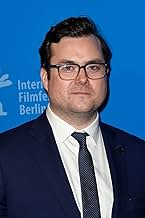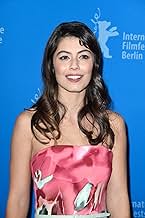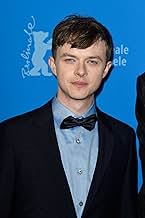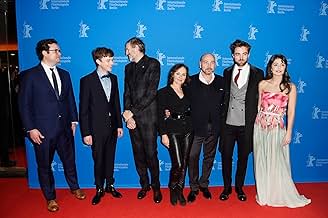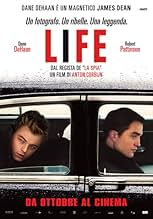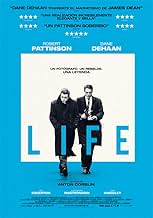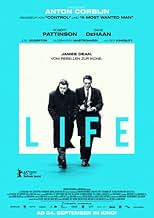Life
- 2015
- Tous publics
- 1h 51min
NOTE IMDb
6,0/10
9,2 k
MA NOTE
Un photographe du magazine LIFE est chargé de prendre des photos de James Dean.Un photographe du magazine LIFE est chargé de prendre des photos de James Dean.Un photographe du magazine LIFE est chargé de prendre des photos de James Dean.
Dane DeHaan
- James Dean
- (as Dane Dehaan)
Avis à la une
Greetings again from the darkness. The film's title has multiple meanings: "Life" Magazine as the source for the famous photographs we have seen so many times; the crossroads in "Life" of both rising star James Dean and photographer Dennis Stock; and a philosophical look at "Life" - how quickly things can change, and how we should appreciate the moments.
Director Anton Corbijn (A Most Wanted Man, The American) and screenwriter Luke Davies offer up a snapshot of 1955 as the not-quite-yet-famous James Dean (Dane DeHaan) traveled cross-country with photographer Dennis Stock (Robert Pattinson) from Los Angeles to New York to Indiana. Each man was searching for their true self as Stock's professional ambition and personal stress are palpable, while 24 year old Dean's ambivalence about his pending superstardom borders on self-destructive.
DeHaan and Pattinson both underplay their roles, and it's certainly more than a little confusing to see Pattinson in a movie about James Dean where he is not the actor playing the icon. DeHaan captures the low key, soft-spoken side of Dean but only teases at the "rebel" studio head Jack Warner (Sir Ben Kingsley) wanted so badly to control. We get a feel for Dean's vision of challenging roles in quality productions a commitment to the art of acting he no doubt sharpened in his time with acting guru Lee Strasberg. The story leans more heavily to the tale of photographer Stock, which is unfortunate, because he is significantly more awkward than interesting. Pattinson plays him as a social misfit who broods nearly as much as the "moody" young actor he is stalking through the streets.
The period look is well appointed, and we are privy to some of the moments of Dean's life just prior to the release of East of Eden and his being cast in Rebel Without a Cause. His relationship with Pier Angelli (Alessandra Mastronardi), friendship with Eartha Kitt (Kelly McCreary), and his bond to the family and farm of his childhood in Indiana are all captured. In fact, it's the clumsy relationship with Stock that comes across as the least realistic portion though it may very well have happened this way. Even the manner in which the famous photographs were taken is underplayed although it makes for a terrific tie-in with the closing credits where the real Stock/Life Magazine photographs are displayed.
It's now been 60 years that James Dean has exemplified Hollywood "cool", a label that can never be removed due to his tragic death in 1955 after making only three films. Capturing the essence of what made Dean cool is unnecessary because it's present in every scene of those three films, as well as the photographs taken by Dennis Stock. That's all the legacy either man needs.
Director Anton Corbijn (A Most Wanted Man, The American) and screenwriter Luke Davies offer up a snapshot of 1955 as the not-quite-yet-famous James Dean (Dane DeHaan) traveled cross-country with photographer Dennis Stock (Robert Pattinson) from Los Angeles to New York to Indiana. Each man was searching for their true self as Stock's professional ambition and personal stress are palpable, while 24 year old Dean's ambivalence about his pending superstardom borders on self-destructive.
DeHaan and Pattinson both underplay their roles, and it's certainly more than a little confusing to see Pattinson in a movie about James Dean where he is not the actor playing the icon. DeHaan captures the low key, soft-spoken side of Dean but only teases at the "rebel" studio head Jack Warner (Sir Ben Kingsley) wanted so badly to control. We get a feel for Dean's vision of challenging roles in quality productions a commitment to the art of acting he no doubt sharpened in his time with acting guru Lee Strasberg. The story leans more heavily to the tale of photographer Stock, which is unfortunate, because he is significantly more awkward than interesting. Pattinson plays him as a social misfit who broods nearly as much as the "moody" young actor he is stalking through the streets.
The period look is well appointed, and we are privy to some of the moments of Dean's life just prior to the release of East of Eden and his being cast in Rebel Without a Cause. His relationship with Pier Angelli (Alessandra Mastronardi), friendship with Eartha Kitt (Kelly McCreary), and his bond to the family and farm of his childhood in Indiana are all captured. In fact, it's the clumsy relationship with Stock that comes across as the least realistic portion though it may very well have happened this way. Even the manner in which the famous photographs were taken is underplayed although it makes for a terrific tie-in with the closing credits where the real Stock/Life Magazine photographs are displayed.
It's now been 60 years that James Dean has exemplified Hollywood "cool", a label that can never be removed due to his tragic death in 1955 after making only three films. Capturing the essence of what made Dean cool is unnecessary because it's present in every scene of those three films, as well as the photographs taken by Dennis Stock. That's all the legacy either man needs.
Potentially this could have been the most interesting work from Anton Corbijn, as he is himself a well-known portrait photographer. The story is about Magnum photographer Dennis Stock (Pattison) convincing a reluctant upcoming James Dean (DeHaan) to follow him to make a series of portraits. As you might know, Magnum set new standards in photography and Stock in his famous series contributed to a completely different view on portrait photography of stars: natural setting, confrontational, honest and direct.
During the movie, a bond grows between the two, as Dean turns out to be an atypical Hollywood star ignoring the rules set out by his superiors resulting in several confrontations. Stock largely ignores his duties to his former wife and their child and becomes obsessed by Dean's idiosyncrasy. The second part is the most interesting as it almost deconstructs Dean's life and character: Dean comes from a farmland family of Quakers, likes local poets and is fond of his background and actually despises stardom. Stock is first able to shoot pictures in New York (you probably know the famous photograph) and in Indiana.
So what are the downsides: the pacing is too slow, the editing certainly not perfect and the most important trap: Corbijn as photographer is too much in love with the story, finding details relevant that are actually not that relevant. The question keeps popping up: Why does this matter? Life fails in a way as a mood piece, but is still a relatively good and stable character drama as the deconstruction works well.
Maybe both Pattison and DeHaan are too light to pull this off more convincing, but one role is certainly amazing: Ben Kingsley as Jack Warner is so spot-on you will be remembering the character despite the limited screen time.
During the movie, a bond grows between the two, as Dean turns out to be an atypical Hollywood star ignoring the rules set out by his superiors resulting in several confrontations. Stock largely ignores his duties to his former wife and their child and becomes obsessed by Dean's idiosyncrasy. The second part is the most interesting as it almost deconstructs Dean's life and character: Dean comes from a farmland family of Quakers, likes local poets and is fond of his background and actually despises stardom. Stock is first able to shoot pictures in New York (you probably know the famous photograph) and in Indiana.
So what are the downsides: the pacing is too slow, the editing certainly not perfect and the most important trap: Corbijn as photographer is too much in love with the story, finding details relevant that are actually not that relevant. The question keeps popping up: Why does this matter? Life fails in a way as a mood piece, but is still a relatively good and stable character drama as the deconstruction works well.
Maybe both Pattison and DeHaan are too light to pull this off more convincing, but one role is certainly amazing: Ben Kingsley as Jack Warner is so spot-on you will be remembering the character despite the limited screen time.
James Dean, although the lead-star of only three films, concreted himself as one of the cinema's golden age legends quite quickly in the 1950's - mainly through his unconventional approach to Hollywood's rules - this is, all before his premature death quite soon later.
Portrayed by Dane Dehaan, LIFE is a satirical chronicle of Dean's rise of an unknown to his Hollywood acting debut of success and fame. Yet, the film is not directly told as a documentary of his life - but via the lens of Robert Pattinson's character, Dennis Stock, a rookie photographer for a photo-agency with aspirations of becoming known.
Set in the 1950's, director Anton Corbijn's take on Dean's life is admirably applaudable as it takes us on an inside look of Dean's short lived fame and anti-fame. The sets, the cinematography, the music and the atmosphere all cipher the 50's pose, as smoking and larger-than-life LA are the standard.
First meeting at a party in 1955, Dennis (the photographer) approaches Dean; a young, sophisticated individual wearing a melo- polo, slicked hair with thick framed glasses and asks who he is. For Dehaan, the performance, both visually and in terms of acting is undeniably suited as he resonates Dean's moody and unique approach, showing him as a person, not merely an icon.
Forming sturdy relationships with Jack Warner (Ben Kingsley), of Warner Brothers Pictures, Dean's talent is soon spotted, and through several frustrations of the individual's motives, he told to 'play the part, follow the rules' and he would be made a star.
For Robert Pattinson, his take on iconic photographer Dennis Stock is equally as impressive as he enters the world of Hollywood from the other side of the carpet (and at bottom). Spotting Dean's talent early, Stock, in the two-hour running time attempts to get photographs of Dean before fame kicks in. Deadlines, pressure and awkwardness soon mount-up, and Pattinson expertly presents it onto screen.
Shot-by-shot, we capture each of Stock's photos of James Dean - but, rather than just a photo and what point it was taken - we are inclusively taken into a perspective of why it was taken, the setting and how they were so important - and now, in retrospective of our present - why so iconic.
http://gonewiththemovies.com/reviews/life-review.php
Portrayed by Dane Dehaan, LIFE is a satirical chronicle of Dean's rise of an unknown to his Hollywood acting debut of success and fame. Yet, the film is not directly told as a documentary of his life - but via the lens of Robert Pattinson's character, Dennis Stock, a rookie photographer for a photo-agency with aspirations of becoming known.
Set in the 1950's, director Anton Corbijn's take on Dean's life is admirably applaudable as it takes us on an inside look of Dean's short lived fame and anti-fame. The sets, the cinematography, the music and the atmosphere all cipher the 50's pose, as smoking and larger-than-life LA are the standard.
First meeting at a party in 1955, Dennis (the photographer) approaches Dean; a young, sophisticated individual wearing a melo- polo, slicked hair with thick framed glasses and asks who he is. For Dehaan, the performance, both visually and in terms of acting is undeniably suited as he resonates Dean's moody and unique approach, showing him as a person, not merely an icon.
Forming sturdy relationships with Jack Warner (Ben Kingsley), of Warner Brothers Pictures, Dean's talent is soon spotted, and through several frustrations of the individual's motives, he told to 'play the part, follow the rules' and he would be made a star.
For Robert Pattinson, his take on iconic photographer Dennis Stock is equally as impressive as he enters the world of Hollywood from the other side of the carpet (and at bottom). Spotting Dean's talent early, Stock, in the two-hour running time attempts to get photographs of Dean before fame kicks in. Deadlines, pressure and awkwardness soon mount-up, and Pattinson expertly presents it onto screen.
Shot-by-shot, we capture each of Stock's photos of James Dean - but, rather than just a photo and what point it was taken - we are inclusively taken into a perspective of why it was taken, the setting and how they were so important - and now, in retrospective of our present - why so iconic.
http://gonewiththemovies.com/reviews/life-review.php
A movie about James Dean stands or falls by the portrayal of the man. Everything else is secondary to capturing that unique mesmerizing person.
I am a straight male, yet I remember the first time I googled that name and started browsing his photos. There was something there completely out of the ordinary. Strength with fragility, sadness with mischievousness, rebellion resting in the moment. Its like watching young Marlon Brando or Ryan Gosling in a movie like Drive, there is something extraordinary there your brain cant define but can understand.
Dane DeHaan, who I don't know outside of this movie, could probably portray Justin Bieber just fine, but playing James Dean requires a different beast of an actor all together.
I am a straight male, yet I remember the first time I googled that name and started browsing his photos. There was something there completely out of the ordinary. Strength with fragility, sadness with mischievousness, rebellion resting in the moment. Its like watching young Marlon Brando or Ryan Gosling in a movie like Drive, there is something extraordinary there your brain cant define but can understand.
Dane DeHaan, who I don't know outside of this movie, could probably portray Justin Bieber just fine, but playing James Dean requires a different beast of an actor all together.
I just can't see Dean Dehaan as James Dean that's why I can't rate higher.
Le saviez-vous
- AnecdotesJames Dean's article written for LIFE Magazine was not very popular at the time when it was first released.
- GaffesPay phones in 1955 did not have metal cords or the receivers shown in the film.
- Citations
James Dean: One more orgasm behind you and one step closer to death.
Meilleurs choix
Connectez-vous pour évaluer et suivre la liste de favoris afin de recevoir des recommandations personnalisées
- How long is Life?Alimenté par Alexa
Détails
- Date de sortie
- Pays d’origine
- Site officiel
- Langue
- Aussi connu sous le nom de
- 叛逆年代
- Lieux de tournage
- Sociétés de production
- Voir plus de crédits d'entreprise sur IMDbPro
Box-office
- Budget
- 12 000 000 $US (estimé)
- Montant brut mondial
- 1 231 606 $US
- Durée
- 1h 51min(111 min)
- Couleur
- Rapport de forme
- 2.35 : 1
Contribuer à cette page
Suggérer une modification ou ajouter du contenu manquant








